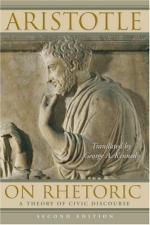|
This section contains 349 words (approx. 1 page at 400 words per page) |

|
Rhetoric
Rhetoric is defined as "the faculty of observe in any given case the means of persuasion" (24). Aristotle is clear on the point that rhetoric is not an art, but rather a tool used by the arts in order to persuade others of their conclusions.
Dialectic
Dialectic is the study of proper argumentation. In dialectic, the chief concern is producing a sound argument and this distinguishes it from rhetoric, which is primarily concerned with producing a persuasive argument.
Virtue
Virtue is a habit or characteristic which helps a person perform good works.
Good
The good is that which all things naturally seek. When a person acts, he always does so with the hope that he will achieve some good.
Happiness
Happiness is the end which all humans seek. It is composed of many different things according to many different people, including virtue, good friends, good children, money, power...
|
This section contains 349 words (approx. 1 page at 400 words per page) |

|




